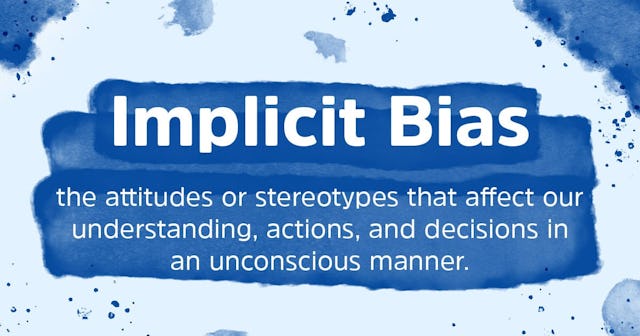What The Hell Is Implicit Bias And Why Is It Dangerous?

Part of my training as a LGBTQIA+ educator is to pull out people’s biases and examine them in a way that enlightens folks to the ideas they hold that feed into homophobic and transphobic behaviors and policies. Most people who show up to my trainings are open to learning and acknowledging their contributions to hurting the queer community; they don’t know what they don’t know, but are ready to make changes.
Other folks sit in my trainings with arms crossed and mouths ready to argue my points, because they believe their opinions are truth over the facts and lived experience I offer. I point out that while I want to change the minds of those with explicit biases, my energy is best spent in helping people work to see and adjust their implicit biases. Great, Amber, but what the hell are implicit biases? And bigots are the real problem — why don’t you want to spend more time on them?
alexa mosley/Reshot
Because getting to the root of implicit biases is what will move us toward helping marginalized communities.
Simply put, an implicit bias is an unconscious attitude or preference we have about someone or a group of people. It is allowing ourselves to associate stereotypes with people in ways that influence what we say and how we act. Many people will tell you they don’t have these implicit biases because they run in conflict with very different belief systems they have; it makes it hard for folks to admit they are wrong, or that they are hurting others. Implicit biases are a predictor of how we will behave in certain situations, and we all have them. If left unchecked, however, they are very dangerous.
Implicit or unconscious biases are deep-seeded ideas that are taught through media, family members, where you were raised, and who you hang out with. They show up in the workplace, financial institutions, schools, medical settings, and the criminal justice system. While my work and understanding of how these biases affect the queer community, my understanding of them can also translate into how they hurt Black people in America.
In her book, Biased: Uncovering the Hidden Prejudice That Shapes What We See Think and Do, Jennifer Eberhardt explores how deep implicit biases run and talks about ways to solve them. Eberhardt is a psychology professor at Stanford University and also won a MacArthur “genius grant.” Her studies have shown that people are more likely to associate crime-related objects (knives, guns) with black faces than white faces. She has also shown that people correlate apes with black faces. She also notes that in 28,000 police stops in 2013 and 2014, 1 out of 4 Black people were handcuffed even when no arrest was made, yet only 1 out 15 white people were handcuffed in the same situation. In an article for Time she says, “Police were seeing it as an officer-safety issue.”
In his TEDx Talk, Dushaw Hockett addresses this as an implicit bias that many people, especially folks in the the criminal justice system, don’t want to admit to and how it goes against what they believe. A police officer may say they are not racist, Hockett says, but their actions say otherwise. A police offer may be committed to the idea of “protect and serve,” yet leads the district in the number of stop and frisks against young black men. Consciously the officer is deeply loyal to the idea of protecting the community; however his behavior is inconsistent with those beliefs because he is showing prejudice against members of said community. The ability to hold these two truths and not see them is what makes implicit biases so dangerous.
Knowing the implicit biases we have allows us to prevent the explicit targeting and harm of others. Acknowledging our implicit biases means acknowledging that we are all racist. The problem is that folks who say they aren’t racist have a very hard time admitting that they could be doing something racist. So instead of doing the work to dismantle our own biases and systematic racism, folks get defensive and deny their role. It’s admittedly hard to look at ourselves because it can be uncomfortable. Admitting we are wrong is uncomfortable, but it’s necessary.
However, one of the tools I give to folks during my trainings when it comes to being an ally to the queer community and to any marginalized community is the gift of mistake. Practice makes mistakes. This allows people to feel the guilt or shame they need to confront while motivating them to move forward to dismantle triggered stereotypes they associate with people based on gender, gender expression, and sexuality. My job is not to shame the people who show up to do the work; my job is to show them the work that needs to be done. Folks won’t do the work if they associate their faults as being faulty themselves.
This can be applied to folks who show implicit bias towards race. Our job is to figure out in what ways our racism presents itself, but before we can dismantle our racism, we need to dismantle our defenses.
Yes, I want the bigots to change. But they and we know and see the damage they do and often they don’t adjust. The microaggressions and unconscious connections we make cause harm too, but for many of us who identify as allies to marginalized communities, we want to do better. We just need to know better. The first step is to let go of the ego and then check our knee-jerk reactions to people who make us uncomfortable.
This article was originally published on